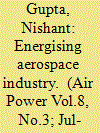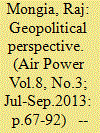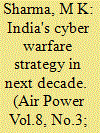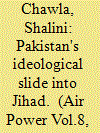|
|
|
Sort Order |
|
|
|
Items / Page
|
|
|
|
|
|
|
| Srl | Item |
| 1 |
ID:
128245


|
|
|
|
|
| Publication |
2013.
|
| Summary/Abstract |
It was surprising that whereas every country wanted to produce her own war material, in India, even very senior officials and Ministers wanted to remain dependent on foreign countries and government for military hardware and would not take any initiative for local production. These people did not understand that a country must not remain forever dependent on another country for her military requirement as, in the event of a war breaking out, that country could stop supplies, putting the receiving country in dire difficulties when her need would be the most acute.
|
|
|
|
|
|
|
|
|
|
|
|
|
|
|
|
| 2 |
ID:
128108


|
|
|
|
|
| Publication |
2013.
|
| Summary/Abstract |
A region in the far reaches of the Himalayas, Tibet looms large in the imagination. It is the original home of the Dalai Lama, one of the great spiritual leaders of our time. Tibetan Buddhism inspires millions worldwide with the twin values of wisdom and compassion. The Chinese takeover of the country six decades ago also shows another side of Tibet- that of a passionate symbol of freedom in the face of political oppression. International sympathy has kept the Dalai Lama's appeals for autonomy of the world's political agenda, but in the light of China's political and economic gains, there is fear that Tibet is in danger of being forgotten by the world. As the Dalai Lama grows older and China threatens to intervene in the selection of Tibet' s next spiritual leader, many wonder whether there is any hope for the cause of Tibet or will it become a casualty of globalization.
|
|
|
|
|
|
|
|
|
|
|
|
|
|
|
|
| 3 |
ID:
128107


|
|
|
|
|
| Publication |
2013.
|
| Summary/Abstract |
The world is witnessing a remarkable shift in the locus of l=global power with the relative decline of the United States of America and the dramatic rise of China. It is estimated that the rise of India and China will alter the nature of the global system and the global landscape in the coming two decades. During this great geo-political transition period, there is an urgent need to revaluate our theories, paradigms, assumptions and strategies in the light of technological, economic, political and military developments in the region. The heavy dependence of government organizations, business, economic activities and military affairs of information and communication technology by (ICT) necessitates incorporation of cyber technology into our strategic calculation. Cyber power is exerting itself as a key lever in the development and execution of national policy, including counter-terrorism, economic growth, and diplomatic affairs.
|
|
|
|
|
|
|
|
|
|
|
|
|
|
|
|
| 4 |
ID:
128093


|
|
|
|
|
| Publication |
2013.
|
| Summary/Abstract |
Pakistan has been in existence for more than six decades but the state has not been able to define its identity till date. Pakistan has been a nation of contradictions; it has shared an ambiguous relationship with Islam, tried to embrace Western notions of modernity, and , at the same time, tried retaining the orthodox Islamic identity, has an overpowering and ambitious army which has ruled the nation for more than 30 years directly, and nearly an equal period with a civilian façade, but has still struggled periodically to go back to the domestic order controlled by the fractured political leadership and has suffered a deep national identity crisis. Lack of identity has encouraged the rise of ethnicity and pluralism with in the Pakistani society. Born as a result the demand of a separate Muslim homeland, it eventually stood as the saviour of Islam and, in the process, the military led state has adopted policies based on religion which have had severe repercussion for the state. Religion has been used in Pakistan for a range of issues from nation-building to strategic security,
|
|
|
|
|
|
|
|
|
|
|
|
|
|
|
|
|
|
|
|
|